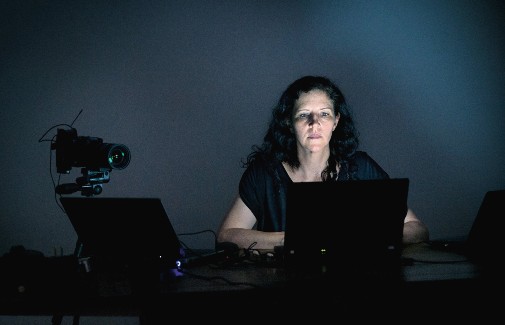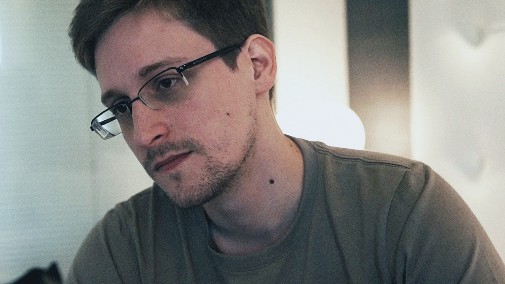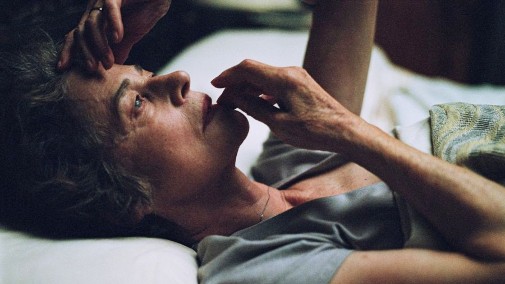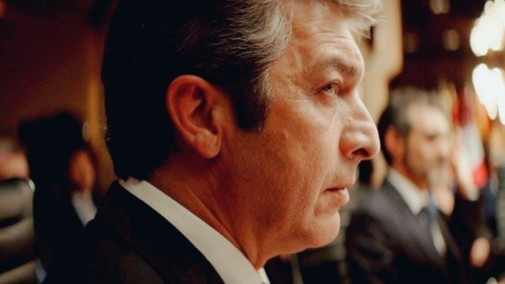
With the fourth day of festivities, conversations about who's a contender for the Golden Lion start to blossom here and there. While the critical response hasn't been unanimous, Laura Poitras' All the Beauty and the Bloodshed could be a future prizewinner. Speaking of Venetian trophies, the last time Andrea Pallaoro competed, Charlotte Rampling won the Volpi Cup for Best Actress. His new film, Monica, has elicited muted responses, but hope is everlasting for its impressive cast led by Trace Lysette and Patricia Clarkson. Finally, Argentina, 1985 reunites director Santiago Mitre with actor Ricardo Darín for a prestigious historical drama that will get its streaming premiere on Amazon Prime Video this October.
For this project's purpose, let's remember when Poitras met Snowden, when Pallaoro led Rampling to Venice gold, and Mitre's first time directing Darín…

CITIZENFOUR (2014)
At this point, it feels needless to argue for Citizenfour's importance as a piece of journalism. Viewers have widely acknowledged its quality, critics, and even the Academy of Motion Pictures, who's so prone to rewarding documentaries for their subject matter rather than their value as cinema. Indeed, when reading about certain docs, it's dispiriting to see how many approach non-fiction filmmaking as an information delivery machine and little else. That's why writers like The Film Experience's own Glenn Dunks are so important, judging such films not merely by what information they present but by how they present it.
I don't claim to be nearly as knowledgeable or dexterous as the Doc Corner writer when analyzing non-fiction works. Nevertheless, I shall try to articulate why Citizenfour strikes me as great cinema beyond the merit of its intent or the urgency of its revelations.
Firstly, it's crucial to consider the elephant in the room – Snowden. Of course, Poitras' access to the whistleblower is why this film exists, and it'll always feel more immediate and authentic than any retrospective efforts. Still, the director never entirely frames the work as an individualistic portrait. In other words, there's a palpable attempt to distance Citizenfour from notions of a personal profile, a hero's journey, or character study. Instead, what matters are the secrets shared, not necessarily their vessel. But can Citizenfour ever divorce itself from its central figure? Can it ever escape his gravitational pull? No, but that only makes it more exciting and thought-provoking.
One finds tension at the film's heart, a push-and-pull between cold documentation and the thrilling possibilities of a fugitive on the run. Poitras doesn't excise the paranoia aspect, nor does the cineaste try to bend non-fiction filmmaking to fiction paradigms. She negotiates complex moods, modulating how her viewers intake such dreaded truths. The director's ability to elicit sublimated terror is apparent throughout, often expressed by formal means – cutting, framing, and sound design. From the claustrophobia of that Hong Kong hotel room to the shrouding shadows of Russian exile, Citizenfour is often involving and alienating, sometimes clinical, always terrifying.
Citizenfour is streaming on the Roku Channel, Tubi, and Freevee. You can also rent it on many platforms.

HANNAH (2017)
Her visage may look like a perfect sculpture of despair, weary lines drawing an expression of perpetual disappointment. The mouth is painted in the ideal shape to transmit never-ending sorrow. As for the eyes, they can be cold, shining with cruelty. Yet, they can also dim into bottomless resignation or become beacons of affection. Charlotte Rampling has the kind of face that's meant to be adored by movie cameras, projected big on the silver screen where it can reach the size of a titan's mask, a goddess' profile illuminating the dark. Visconti understood this, and so did Pakula, Cavani, Oshima, and other such masters of cinema.
Andrea Pallaoro may not be at their level – not yet – but he certainly shares their understanding of Rampling's power as a screen presence, a face. The polyglot actress is present in almost every shot of Hannah, the portrait of a woman unraveling, loss overtaking mundane life until all that's left is a living ghost. Through his leading lady, Pallaoro articulates a study on societal pressures refracted by a prism of individual pain. It's the dolorous reality of a wife whose husband rots behind bars, whose son renounces her and forbids the grandmother from being in her grandchild's life. Not even the pet dog is willing to assuage her loneliness, preferring to pine for one that is absent.
Denoting the project's foremost value as an actor's exercise, Hannah partakes in bizarre acting classes, finding a way to be alive through fiction, to disappear within a collective movement on stage. In these workshopping interludes, Rampling first sketches a smile – one of three across a film that's too monotonously bleak for its own good. Indeed, one of those smiles is nothing if not a prelude to the most immense ache of all, one so strong it punctures apathy and draws uncontrollable tears. Only in the limbo of transitions, liminal spaces within the film's architecture, does Hannah truly find peace. Rampling and the audience can breathe freely before another plunge into the abyss.
Hannah is streaming on the Roku Channel, Kanopy, Redbox, and FILMRISE. You can also rent the film on some other platforms.
THE SUMMIT (2017)
The Summit is another film that works best as a showcase for its leading thespian, as limiting as that might be. It's a risky gambit that could easily lead it down the path to mediocrity, but the acting is exceptional enough to justify it, elevating the film while complicating its central ideas, themes, philosophies.
Ricardo Darín plays Hernán Blanco, a humble man who rose from provincial government into the highest echelon of his country's politics. As we find him, he's the president of Argentina, preparing to go on a trip with global consequences. A Summit of Latin American presidents is to take place in Chile's cordilleras at an isolated ski resort. The continent's leaders gather for a momentous decision, figuring out what to do with newfound energy resources that might alter international hierarchies of power. Brazil's forceful president demands South American unity as a way to ascertain control. On the other hand, Mexico seeks an alliance with its northern neighbors and an economic link with US companies.
Santiago Mitre stages these negotiations with solemnity, underlining the pomp and circumstance of world leaders talking around each other in tailored suits, dissimulations indistinguishable from honesty. The cast is up to the task of making the procedural riveting, comprising a murderer's row of Pan-American talent. There's Érica Rivas as Blanco's confidant, Alfredo Castro a portentous doctor. Daniel Giménez Cacho is Mexico's President, while Paulina Garcia is the Chilean commander and chief. Elena Anaya adds a Spanish twist to the proceedings as a probing journalist, while Christian Slater is a one-scene wonder playing the US Secretary of State.
And yet, no matter how wonderful they are, none can hold a candle to Darín, who's doing some of his best work ever. The Argentinian star is exceptional at weaving ambivalence through official meetings, interview scenes, imbuing the text with a Shakespearean zest. This sardonic yet revealing edge would make him a perfect fit for something like Succession. He's so agile at weaving character detail through political subterfuge that more melodramatic interludes having to do with a suicidal daughter, and visions from the past feel extraneous. This character-based piece doesn't need such naked psychology when Darín can sketch it all in subtext.
Even so, one can't be too mad at those passages when they give the actor ample opportunity to show off. A discussion of sexual misadventures is a beautiful tonal variation, and the accusation of murder unleashes a beast buried deep down that recontextualizes all we've come to know about the man.
You can rent The Summit on Apple iTunes, Amazon, Google Play, and Youtube.
Are you a fan of any of these filmmakers? If so, what's your favorite from their output?
